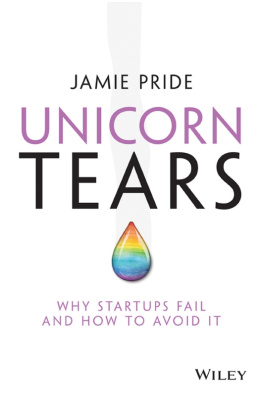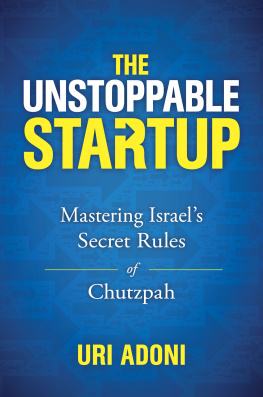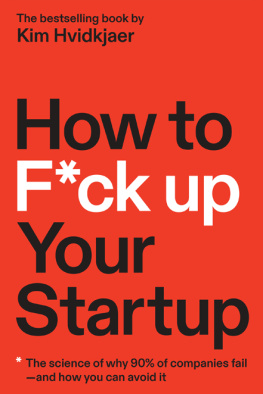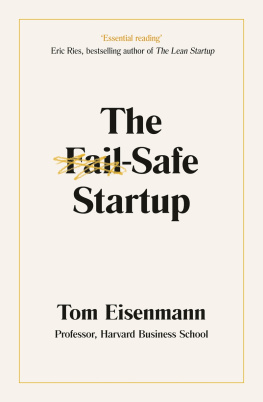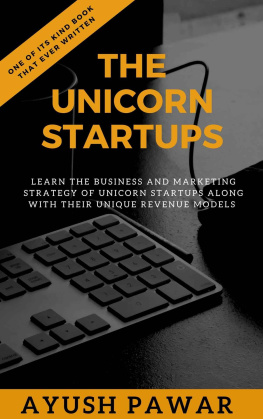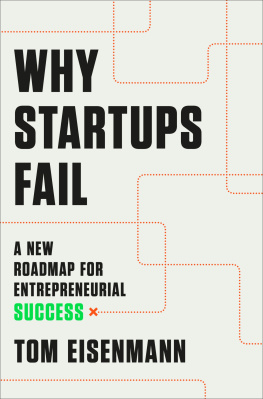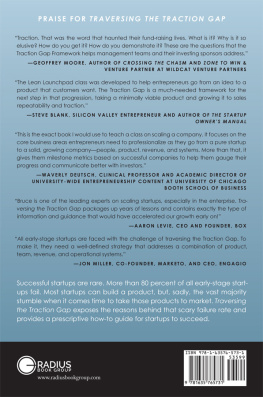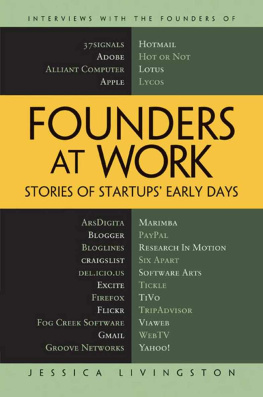There are moments in life when you step up. Starting youre own business is one of the biggest. Its rare to find the few who will and rarer still to find a mentor who has. Jamie has and in Unicorn Tears he shows us how to avoid failure and crush it in business.
Matt Church, founder of ThoughtLeaders, author of
Next: thriving in the decade of disruption
Unicorn Tears has it all; why businesses fail, how to succeed, and how to enjoy the journey. All presented by one of the countries most respected entrepreneurs and investors. This is a must read.
Jack Delosa, CEO and founder of The Entourage
If you are a startup, thinking about becoming one, or simply interested in the idea of entrepreneurialism and how to maximise your chances of success, as opposed to becoming one of the 92 per cent that fails, then Jamies book, Unicorn Tears, is a must-read. Jam-packed with how tos and ideas, and supported with his own stories and those of others, Unicorn Tears, is essential reading for anyone serious about startup success.
Janine Garner, speaker, mentor, author of Its Who You Know
We live in a world where expertise is all too readily claimed and the academic world has become, well, a little bit academic. This is what makes Jamie Prides observations so valuable his knowledge and wisdom has been earned through experience in real world conditions with numerous startups. He makes me want to be a better entrepreneur and every time we speak, he helps me do just that.
Dan Gregory, CEO, The Impossible Institute

First published in 2018 by John Wiley & Sons Australia, Ltd
42 McDougall St, Milton Qld 4064
Office also in Melbourne
John Wiley & Sons Australia, Ltd 2018
The moral rights of the author have been asserted

All rights reserved. Except as permitted under the Australian Copyright Act 1968 (for example, a fair dealing for the purposes of study, research, criticism or review), no part of this book may be reproduced, stored in a retrieval system, communicated or transmitted in any form or by any means without prior written permission. All inquiries should be made to the publisher at the address above.
Cover design by Wiley
Cover images: Evgenii141/iStockphoto-Rainbow,
123dartist/iStockphoto-Water Drop
Disclaimer
The material in this publication is of the nature of general comment only, and does not represent professional advice. It is not intended to provide specific guidance for particular circumstances and it should not be relied on as the basis for any decision to take action or not take action on any matter which it covers. Readers should obtain professional advice where appropriate, before making any such decision. To the maximum extent permitted by law, the author and publisher disclaim all responsibility and liability to any person, arising directly or indirectly from any person taking or not taking action based on the information in this publication.
For Sam, Phoebe, Harrison and Imogen
CONTENTS
List of Illustrations
- Chapter 2
- Chapter 6
- Chapter 7
- Chapter 8
- Chapter 9
Guide
Pages
Unicorn: a technology startup company that reaches a $1 billion market value as determined by private or public investment.
Unicorn tears: the 92 per cent of technology startups that fail within the first three years of launch.
ABOUT THE AUTHOR
Jamie Pride is a serial entrepreneur and venture capitalist on a mission to help build better founders and a better venture capital ecosystem to support them.
As an entrepreneur, Jamie sold his first startup, Velteo, to New Yorkbased system integrator Bluewolf, and has founded six technology startups. As an investor, he has raised more than $16 million in funding for startups via private and public markets, including completing an IPO on the Australian Stock Exchange in 2015.
He has more than 20 years experience with international technology and digital media organisations, including leading realestate.com.au and senior positions with Deloitte Digital, salesforce.com, Red Hat, Veritas and Cisco Systems.
Jamie is also a sought-after public speaker and regularly comments on startups, entrepreneurship, venture capital, disruptive innovation and design thinking.
He is the managing partner at Phi Digital Ventures, an early-stage, social impact venture fund that seeks to invest in Australian companies looking to change the world. He is also the co-founder of The Founder Lab, an educational institution for entrepreneurs that seeks to build and support better founders.
Having worked extensively as both an entrepreneur and an investor he has a unique insight into what it takes to make a startup successful and what it takes to get funded.
INTRODUCTION
THERE HAS TO BE A BETTER WAY!
Over the past 20 years I have founded and funded numerous technology startups. During that time I have seen a clear pattern emerging: startup failure has become an accepted industry norm, and it has an impact that reaches far beyond financial loss to investors. Having experienced my own journey of failure as a founder more than once, I have felt the very real, deep, personal impact of that failure on me, my family and my colleagues.
As I sat at home, licking my wounds from my most recent startup failure, the thought of writing this book took hold and it soon became an obsession for me. I started talking to founders, and what they shared with me didnt surprise me at all. Many of the first-time founders I spoke to were lost, with no map to guide them; even the more experienced founders, burnt out or stressed out, felt alone, isolated, with nowhere to turn for support. I was determined to write a book on startup failure by a founder for founders.
I quickly discovered that startup failure is ingrained in the ecosystem. Concepts such as fail fast, misunderstood and misapplied, are thrown around without much thought. The traditional venture capitalist approach to failure is to place a lot of bets on the understanding that, while most ventures will fail, a very few may turn out to be unicorns and return vast profits that will make up for all the losses. It is a very wasteful approach.
The financial waste in failed startups is fairly widely understood; less recognised is the largely unspoken issue of human waste. Ive seen the dark side of startups: 49 per cent of founders in one survey reported some kind of mental health issue. By their own admission, more than 30 per cent of founders have experienced depression while 27 per cent have suffered serious anxiety. Founders are fatigued!
But isnt the startup game meant to be fun, exciting and glamorous? Dont we keep seeing successful startup founders smiling on the front pages of the business press, having completed their latest triumphant capital raising or IPO? The culture of Im crushing it makes it hard for founders to admit they are struggling.
The irony is that most startup failure is preventable. In its simplest form, startup failure is often a consequence of self-harm: rather than crumbling in the face of overwhelming external competition, startups typically implode. This is good news, because it means you can do something about it!
There is a better way. In this book you will learn:
- the three elements of startup DNA and how each one contributes to failure
Next page
